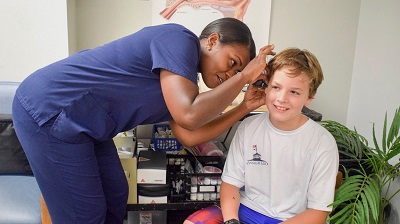
The Hearing Assessment Centre of the Korle Bu Teaching Hospital (KBTH) in Accra, has appealed to government to provide hearing assistive devices for patients with hearing losses and apply some tax waivers as medical products.
This is because the devices are very expensive and a burden on the families of patients with hearing losses who need them to be able to communicate with society.
The Audiologist in-charge of the Centre, Mrs Jemima Anowa Fynn, made the appeal yesterday in an exclusive interview with the Ghanaian Times in Accra to mark World Hearing Day.
The Day instituted by the World Health organisation (WHO) and observed on March 3, every year, focuses on the importance of safe listening as a means of maintaining good hearing throughout one’s life.
It had the global theme; “To hear for life, listen with care.”
Mrs Fynn said there has been increase in the numbers of patients – both adults and children – over the years at the centre with complaints of difficulty in hearing, due to everyday sounds known in medical terms as hyperacusis.
She mentioned pastors and band members, factory workers in heavy machines noise making environment as some of the patients reporting with hearing difficulty due to the nature of their work environment.
She also cited some potential young recruits to security services whom she added, have failed their hearing screenings due to damage to their ears by personal audio devices or exposure to environmental noises.
Giving some statistics to buttress her point, the audiologist said attendance- clients undergoing hearing assessments between January and February this year were 274 patients.
Continuing, Ms Fynn said the Centre recorded an average of 1,495 per year between 2005 and 2015, while in 2019 it had a total of 2, 047 patients in 2019.
She said the patients number reduced to 1, 706 in 2020 explaining that the Centre was closed down during COVID-19 lockdown period.
The audiology expert mentioned other situations in Ghana that put our ears at risks were social events like parties, funerals, where Dis Jockeys (DJs) turn on the volume of music so high that people sitting close to each other have to shout on top of their voices to engage in conversation.
“It is not uncommon to see passengers in public transport with earphones, ipods enjoying their music or news, but if one sitting by you, should hear from your device, then the volume is too loud for your ears.
Young affluent people also are in the habit of playing very loud music in fully rolled up cars but bystanders can hear from these cars.”
Ms Fynn called on health and safety departments of industries and the Factory Inspectorate Authority to ensure appropriate use of hearing protection devices for noisy machines, and gowns for those using chemicals.
Similarly, she urged the Environmental Protection Authority to enforce their laws on noise in public places.
BY NORMAN COOPER







